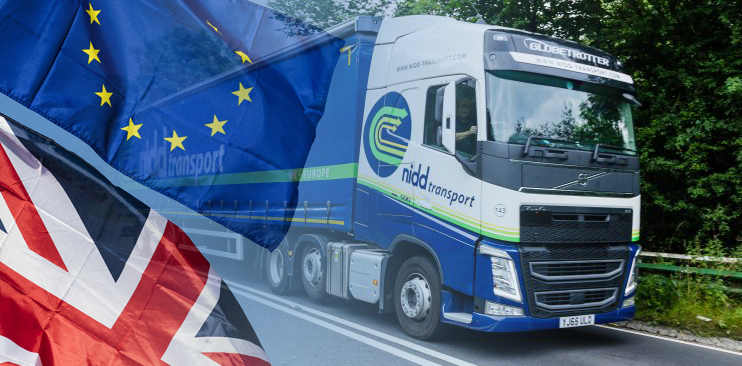Brexit
Is your business experiencing challenges with what you need to do now the transition period is over?
Ensure your customs declarations are compliant to avoid unnecessary delays and extra costs.
The start of 2021 has seen our freight forwarding team working closely with businesses to help them adapt to the changes and new regulations for UK and EU bound shipments following the end of the Brexit transition period.
If you as a business are planning on importing and exporting in 2021 and are unsure on what you need to do to avoid delays and additional costs, please use our below checklist for guidance or get in touch with us today: sales@nidd-transport.com
Although a trade deal is in place, it is important to remember that customs formalities are still needed for all UK/EU shipments and there are a number of actions you must do as a business to ensure your shipments move smoothly – We are here to help, so do not worry.
Below is a checklist of what you will need:
Economic Operator Registration and Identification (EORI) numbers are required if a company wishes to export to or import from the EU.
If you have not yet registered for your EORI number, please follow the link: https://www.gov.uk/eori
Commodity codes identify your products for import and export and have to be declared on a customs entry. Commodity codes classify goods for import and export so you can:
• Fill in declarations and other paperwork
• Check if there’s duty or VAT to pay
• Find out about duty reliefs
Check your commodity codes: Commodity Codes
Put simply, a CPC code (Customs Procedure Code) identifies the reason why you are importing or exporting. The code describes the purpose of your shipment, which in turn directly determines how your shipment is processed and ultimately, if, how, when and from whom duties and taxes are collected.
To check your commodity codes please use these links:
- Commercial invoice number
- Commercial invoice date
- Seller name and address
- Seller EORI Number
- Buyer name and address
- Buyer EORI number
- Country of origin of the goods
- Number of packages
- Type of packages
- Description of goods
- Gross weight
- Net weight
- Volume
- Goods value and currency
- Incoterms
- Commodity codes and breakdown:
- Commodity Code
- of pieces
- Gross weight
- Net weight
- Value
Rules of Origin (RoO) are used to determine the “economic nationality” of a product and by customs authorities to classify where an export has come from in order to work out tariffs and restrictions.
Under a free trade agreement (FTA), exporters must prove that a good is ‘originating’ according to preferential RoO in order to access preferential tariff rates. RoO in FTAs prevent third countries from accessing, at a preferential rate, the markets of countries with whom they do not have a trade deal, such as China.
Customs have given the following declaration as being acceptable for such rules of origin. The document must be signed and the signature can be electronic.
The exporter of the products covered by this document (Exporter EORI No ...) declares that, except where otherwise clearly indicated, these products are of (for example UK) preferential origin.
…………………………………………………………….............................................
(Place and date)
…………………………………………………………….............................................
(Name of the exporter)
Since the end of the EU transition period, we are finding that some customers are not aware of the mandatory requirements for their commercial export invoice for shipments moving between the UK and European Union. This is causing delays and additional administration for our export operators. We therefore ask you ensure that your invoice contains the following information:
- Exporters address and EORI number
- Importers address and EORI number
- Importers contact details, email address, phone number and contact name.
- Delivery address if different to the importers address
- INCO terms
- Export invoice number
- Description of goods for each different line
- Number of pieces for each invoice line and totalled
- Nett weight for each invoice line and totalled
- Total gross weight
- Carton/Case/Pallet dimensions (unless an additional packing list is supplied)
- Commodity code/HS code for each invoice line
- Invoice currency
- Value for each invoice line and totalled
- Statement of Origin
The use of wooden pallets/packaging material must be compliant to ISPM15 heat treatment the UK Government (DEFRA) have confirmed that from the 1st January 2021, it will be a legal requirement for all wood packaging material moving in both directions between UK and the EU to be compliant with a treatment and mark as specified in the International Standard for Phytosanitary measures No 15 (ISPM15).

